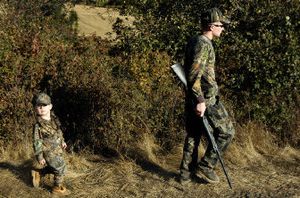Timely advice before wild turkey spring season opens Friday
HUNTING -- Here are a few hunting basics to ponder before the spring wild turkey gobbler season opens Friday in Idaho and Washington.
The tips are from Mossy Oak pro staff member Mike Cockerham, who offers advice on scouting,
advance work and the preparation it takes to bag a spring gobbler:
Yes, this doesn't give you much chance to apply all the information before the season opens tomorrow, but many hunters believe the best time to lure in big gobblers isn't opening day, when they're firmly attached to hens, but rather later in the season when they're lonesome and looking again for love.
Read on for the Q & A.
Q: Can you give me a few general tips on how I can be more successful
this spring?
A: Being more successful means practicing with your calls and becoming
proficient in using several different types. Also scouting and learning
your hunting area can make a big difference in your success.
Q: How much scouting should I do before the season?
A: You should be as familiar with your primary hunting area as you are
with your own backyard. That way you can try to anticipate what the
turkey is going to do and act accordingly.
Q: Is there a best call to use?
A: The best call to use is the call you have the most confidence in.
That could be a call you have called in birds with before or the one you
have practiced with the most and are the most familiar with.
Q: Do I need to learn to use several different calls?
A: The use of several calls is crucial because turkeys may respond to
one call today and respond to a totally different call tomorrow. Also
the use of several different calls can make the appearance of several
different hens instead of just one.
Q: What do you do to take care of your calls?
A: The care of calls for me is putting my mouth calls in the fridge
during the off season and putting my friction calls in a container out
of the heat and cold.
Q: What is a common mistake that turkey hunters make?
A: Most common mistake in my opinion would be not enough patience and
calling too much.
Q: Do you use decoys? If so how?
A: I use decoys most of the time because I hunt a lot of open areas
where the birds can see a long way. The decoy seems to confirm the
presence of a real turkey. I use a full strut decoy with a hen.
Q: What should I do if I go out and don't hear any gobbling?
A: This is where your scouting and being familiar with your hunting area
will pay off. Find a spot that is being used, find a good comfortable
spot and wait while calling sparingly.
Q: If I can hunt all day, is there a best time to hunt?
A: Obviously the best time is early morning before fly down since the
gobbling is usually much better, but don't give up on late morning and
afternoon. The hens will leave the gobblers in the late morning and they
can become lonely and start gobbling again and can respond very well.
The afternoon can be good because the birds like to feed before going to
roost, so you can set up on a likely feeding area and get him before he
goes to bed.

